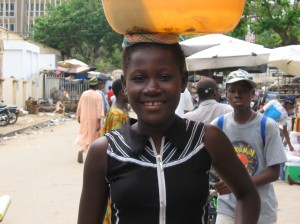 Every Aicha belongs in school not in a market place, a look back confirms
Every Aicha belongs in school not in a market place, a look back confirms
On the road in 2005, we met a 13-year old girl named Aicha at a market in the country of Togo, West Africa. It was early October. School had just begun. We knew the sad reality that many children who long to be in school but can’t afford it are found there. They are either working for their parents to help out at home or for themselves in hopes of being able to go back to school.
So we never miss a walk at the market places if we can help it.
People milling about were making a few purchases. Indeed, many children were working, selling anything from onions and local beverages to palm nut oil, which they carried on their heads. Among the children we saw that sunny afternoon, was Aicha. On her head, she held a large bowl containing many small white plastic bags of cold water.
“Ice wata, ice wata,” she said, walking toward every passerby and proposing her merchandise.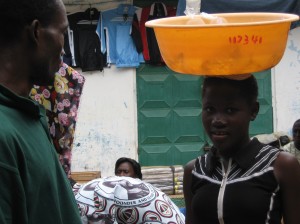
“Ice Wata,” I called out, trying to find a way to talk to this young girl.
She walked quickly over to us. I helped her lower the bowl down to the ground.
“How many?” she asked us.
“How much?” I asked her.
Each bag of water sold for about 1/8 of a dollar.
“We want all of it,” I said. She laughed at us. She wanted to leave because she didn’t think we were serious. My colleague took one bag and started to drink from it. He took a second, then a third.
“We’ll pay you when we get to the last bag,” my colleague said. She thought it was fine by her. This prompted us into a conversation.
“What’s your name?” I asked.
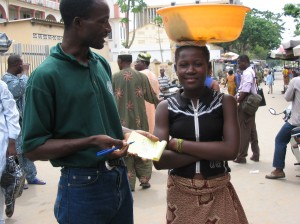 “Aicha,” she said.
“Aicha,” she said.
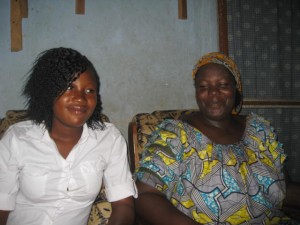 We learned that Aicha was selling water to help put herself and her seven younger siblings through school. As we continued the conversation she felt a bit more comfortable with us and agreed to take us to her school. From the market place, that afternoon, we went to her school and paid her school fees, then to her home where we met her mother who first was upset at our audacity to follow her daughter home. Who would be happy to see her 13-year old daughter in the company of two strangers? But then Aicha informed her of what happened. We told her that we would help her with the education of her children. In tears, the mother jumped up like she could smother all of us in a hug. Emotion took over her voice as she struggled to thank us.
We learned that Aicha was selling water to help put herself and her seven younger siblings through school. As we continued the conversation she felt a bit more comfortable with us and agreed to take us to her school. From the market place, that afternoon, we went to her school and paid her school fees, then to her home where we met her mother who first was upset at our audacity to follow her daughter home. Who would be happy to see her 13-year old daughter in the company of two strangers? But then Aicha informed her of what happened. We told her that we would help her with the education of her children. In tears, the mother jumped up like she could smother all of us in a hug. Emotion took over her voice as she struggled to thank us.
Frankly that day, we didn’t know The Children of Lavié would be around in the long run to support her. We just thought we would try anyway. Your donations have kept Aicha in school where she has been taking the opportunity you have given her seriously. Both in 2011 and in 2012, she was first in her class, and then, she prepared and earned her Baccalaureate degree.
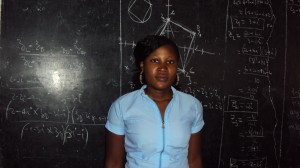 Today, she is enrolled in college she started in October 2014. The Children of Lavié has seen Aicha grow with strong confidence and greater optimism. Just like any young girl around the world, she now talks about music and celebrities, and cannot understand how I not only have never met Rhianna but do not even know her songs. As I write, I can’t help but think that she probably has also learned about the song RUDE that has become my new favorite since the summer of 2014. I am sure she would also agree and appreciate as I do that she wouldn’t have been where she is today without the education she has received.
Today, she is enrolled in college she started in October 2014. The Children of Lavié has seen Aicha grow with strong confidence and greater optimism. Just like any young girl around the world, she now talks about music and celebrities, and cannot understand how I not only have never met Rhianna but do not even know her songs. As I write, I can’t help but think that she probably has also learned about the song RUDE that has become my new favorite since the summer of 2014. I am sure she would also agree and appreciate as I do that she wouldn’t have been where she is today without the education she has received.
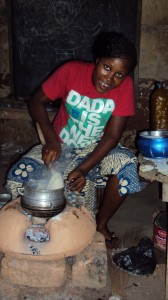
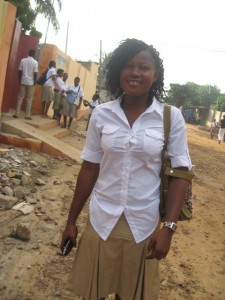 In one of our conversations, Aicha knew exactly what she would like to become one day.
In one of our conversations, Aicha knew exactly what she would like to become one day.
“Would you like to become an artist like Rhianna or Beyonce?” I asked her.
“No. A journalist,” she said. When I asked her why, her demeanor turned serious.
“Because it is cool to have the power to tell the world what goes on in my community.”
You, our donors, are not only helping the Children of Lavié plant the seeds of change. Your unwavering commitment to our mission has been empowering people, one educated child at a time.
Aicha’s mother is proud and thankful for the 9-year successful journey we have taken with Aicha. Even her face cannot hide her sincere gratitude.




